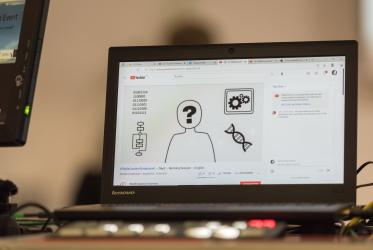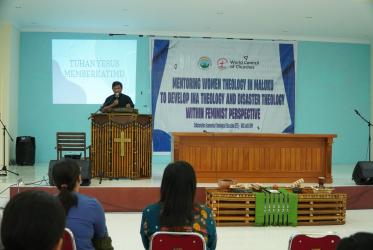Social Justice in Our Digital Age: An Ecumenical Aim
Dr Agnes Abuom
Moderator, WCC Central Committee
Thank you, each and all, for your participation in this symposium on “Communication for Social Justice in a Digital Age.” This topic is recent, urgent, and multidimensional, so your input from a variety of disciplines, social contexts, and points of view enables us to bring the whole subject of social justice in the digital field into view.
I offer a special thanks to our cosponsors in this enterprise, the World Association for Christian Communication, which has long championed these issues and a deeper understanding of what is at stake in “digital justice.” We owe a debt of thanks, too, to our partners at Brot für die Welt, the Evangelical Church in Germany (EKD), Evangelische Mission Weltweit (EMW), and the World Student Christian Federation, which have co-organized the conference.
This symposium has brought together research, experiences from different regions and communities, expert input, and ethical and theological reflection, all in the interests of building a vision of a more just digital (and human) society and actions to make that happen. As Tijana Petković recently wrote, “We need a deeper, theologically informed interdisciplinary engagement about new understandings of technology and how technology might contribute to human flourishing.”
Mentioning theology hints at the profound values at stake in our digital communication. The longstanding concern in the ecumenical world about modern communication and technology has been sharpened by the pandemic and the need to “go virtual” in our organizations, businesses, churches, and families.
Though fascinating in itself, it is less the intrinsic interest of digital communication and more its pervasive presence in our lives, that spurs our many-sided concerns and reflections. That is why I so appreciated the conference organizers’ division of the topic into the different arenas of access and equity (digital justice), public and social media (public space), and constructive frameworks (vision for the future). I look forward to learning more from the insights in the papers and discussions that have been presented here.
For my part, and from the vantage point of my own work with the churches in Africa elsewhere, I have seen churches and church bodies rapidly embrace digital technology during the pandemic to keep in touch with their congregations during the pandemic. Youth have played a pivotal role assisting clergy and church workers to use technology in their ministry as well accompanying them in pastoral ministry. In fact, digital communication has broadened the reach of the churches and health agencies, enabling their voices to be heard in boardrooms of decision makers and the powerful, as well as in homes where spiritual solace and reassurance were desperately needed.
But of course, alongside its potential for building human community, we also see a more problematic side to these developments. We see that substantial portions of the world’s populace is denied these benefits. We see some social media displacing real personal ties, even as they invade privacy. We see some public media mocking objectivity by bending coverage to suit their own ideological or racist or xenophobic agendas and markets. And we see manipulation of media by leaders and governments for their own personal or political gain. Digital media in themselves and in their uses are not unalloyed good news.
That is why I so appreciate your careful reflection on this whole range of practical and theoretical, ethical and theological issues. As you know, our flagship journal, The Ecumenical Review, has devoted space to parsing the implications of digital developments. And the most recent meeting of the WCC’s central committee explicitly requested a position paper on them. Indeed the topic has been solidly incorporated into plans for our 11th Assembly next year. So we are very hopeful that your work here will help us understand this vast area, discern the values that can be nurtured there, and identify opportunities for action at the assembly and beyond.
May your work enlighten and inspire our work for social justice in our digital age.





